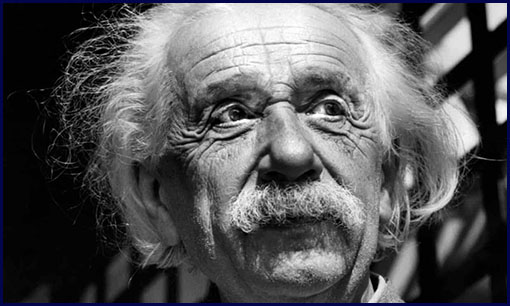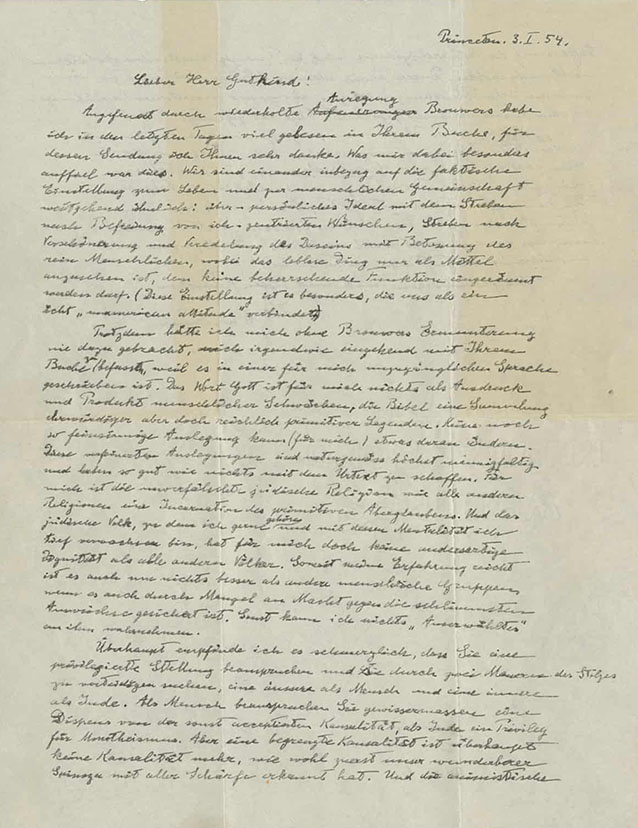Albert Einstein's "God Letter"
For me the question is not so much,
Who is God - Allah, Jahweh or Jehovah, Christ or Jesus, Sat Nam, Shiva, Vishnu or Krishna? But rather, What is God? This blog
is about Albert
Einstein’s letter - the so-called "God Letter" - to the
author of a book that apparently espouses orthodox
religion (I'm unaware of the book). SMH.
Einstein is clear about it: The belief in God is childish superstition. I most certainly agree with him … as long as we talk of God as the supernatural agent - deemed our creator - who is actively interested in the affairs of human individuals.
But there are many other ways to look at the concept of God … I try to do that in my book en.light.en.ment; a good start are my essays GOD 1 and GOD 2. Furthermore, Einstein himself often mentioned his belief in Spinoza's God-in-Nature.
Anyway, now we hear that the handwritten missive fetched almost $3m at auction on Tuesday 4 Dec 2018. Christie’s auction house in New York stated on Tuesday afternoon that the letter, including the buyer’s premium, fetched $2.89m under the hammer. That was almost twice the expected amount. The one-and-a-half-page letter, written in 1954 in German and addressed to the philosopher Eric Gutkind, contains reflections on God, the Bible and Judaism.
I have an essay EINSTEIN in my book.

In January of 1954, just a year before his death, Albert Einstein wrote the letter to philosopher Erik Gutkind after reading his book, Choose Life: The Biblical Call to Revolt. Apparently Einstein had only read the book due to repeated recommendation by their mutual friend Luitzen Egbertus Jan Brouwer. The letter was bought at auction in May 2008, for £170,000.
Translated Transcript: Princeton, 3. 1. 1954
Dear Mr Gutkind,
Inspired by Brouwer's repeated suggestion, I read a great deal in your book, and thank you very much for lending it to me. What struck me was this: with regard to the factual attitude to life and to the human community we have a great deal in common. Your personal ideal with its striving for freedom from ego-oriented desires, for making life beautiful and noble, with an emphasis on the purely human element. This unites us as having an "unAmerican attitude."
Still, without Brouwer's suggestion I would never have gotten myself to engage intensively with your book because it is written in a language inaccessible to me. The word God is for me nothing more than the expression and product of human weakness, the Bible a collection of honorable, but still purely primitive, legends which are nevertheless pretty childish. No interpretation, no matter how subtle, can change this for me. For me the Jewish religion like all other religions is an incarnation of the most childish superstition. And the Jewish people to whom I gladly belong, and whose thinking I have a deep affinity for, have no different quality for me than all other people. As far as my experience goes, they are also no better than other human groups, although they are protected from the worst cancers by a lack of power. Otherwise I cannot see anything "chosen" about them.
In general I find it painful that you claim a privileged position and try to defend it by two walls of pride, an external one as a man and an internal one as a Jew. As a man you claim, so to speak, a dispensation from causality otherwise accepted, as a Jew the privilege of monotheism. But a limited causality is no longer a causality at all, as our wonderful Spinoza recognized with all incision, probably as the first one. And the animistic interpretations of the religions of nature are in principle not annulled by monopolization. With such walls we can only attain a certain self-deception, but our moral efforts are not furthered by them. On the contrary.
Now that I have quite openly stated our differences in intellectual convictions it is still clear to me that we are quite close to each other in essential things, i.e; in our evaluations of human behavior. What separates us are only intellectual "props" and "rationalization" in Freud's language. Therefore I think that we would understand each other quite well if we talked about concrete things.
With friendly thanks and best wishes,
Yours, A. Einstein

For good measure, here's the German transcript:
Lieber Herr Gutkind!
Angefeuert durch wiederholte (Auforderungen - von Einstein durchgestrichen) Anregung Brouwers habe ich in den letzten Tagen viel gelesen in ihrem Buche, für dessen Sendung ich Ihnen sehr danke. Was mir dabei besonders auffiel war dies. Wir sind einander inbezug auf die faktische Einstellung zum Leben und zur menschlichen Gemeinschaft weitgehend identisch: unser - persönliches - Ideal mit dem Streben nach Befreiung von ich-zentrierten Wünschen, Streben nach Verschönerung und Veredelung des Daseins mit Betonung des rein Menschlichen, wobei das leblose Ding nur als Mittel anzusehen ist, dem keine beherrschende Funktion eingeräumt werden darf. (Diese Einstellung ist es besonders, die uns als „unamerican attitude“ verbindet.)
Trotzdem hätte ich mich ohne Brouwers Ermunterung nie dazu gebracht, mich irgendwie eingehend mit Ihrem Buche zu befassen, weil es in einer für mich unzugänglichen Sprache geschrieben ist. Das Wort Gott ist für mich nichts als Ausdruck und Produkt menschlicher Schwächen, die Bibel eine Sammlung ehrwürdiger, aber doch reichlich primitiver Legenden. Keine noch so feinsinnige Auslegung kann (für mich) etwas daran ändern. Diese verfeinerten Auslegungen sind naturgemäss höchst mannigfaltig und haben so gut wie nichts mit dem Urtext zu schaffen. Für mich ist die unverfälschte jüdische Religion wie alle anderen Religionen Incarnation des primitiven Aberglaubens. Und das jüdische Volk, zu dem ich gerne gehöre, und mit dessen Mentalität ich tief verwachsen bin, hat für mich doch keine andersartige Dignität als alle anderen Völker. Soweit meine Erfahrung reicht ist es auch um nichts besser als andere menschliche Gruppen, wenn es auch durch Mangel an Macht gegen die schlimmsten Auswüchse gesichert ist. Sonst kann ich nichts „Auserwähltes“ an ihm wahrnehmen.
Überhaupt empfinde ich es schmerzlich, dass Sie eine privilegierte Stellung beanspruchen und die durch zwei Mauern des Stolzes zu verteidigen suchen, eine äussere als Mensch und eine innere als Jude. Als Mensch beanspruchen sie gewissermassen eine Dispens von der sonst acceptierten Kausalität, als Jude ein Privileg für Monotheismus. Aber eine begrenzte Kausalität ist überhaupt keine Kausalität mehr, wie wohl zuerst unser wunderbarer Spinoza mit aller Schärfe erkannt hat. Und die animistische Auffassung der Naturreligionen wird im Prinzip durch Monopolisierung nicht aufgehoben. Durch solche Mauern können wir nur zu einer gewissen Selbsttäuschung gelangen; aber unsere moralischen Bemühungen werden durch sie nicht gefördert. Eher das Gegenteil.
Nachdem ich Ihnen nun ganz offen unsere Differenzen in unseren intellektuellen Überzeugungen ausgesprochen habe, ist es mir doch klar, dass wir uns im Wesentlichen ganz nahe stehen, nämlich in den Bewertungen menschlichen Verhaltens. Das Trennende ist nur intellektuelles Beiwerk oder die „Rationalisierung“ in Freud’scher Sprache. Deshalb denke ich, dass wir uns recht wohl verstehen würden, wenn wir uns über konkrete Dinge unterhielten.
Mit freundlichem Dank und besten Wünschen
Ihr A. Einstein.